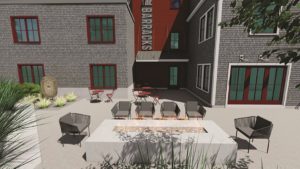PROVINCETOWN — The planning board will again consider Patrick Patrick’s seasonal worker dormitory proposal at its meeting on Thursday, June 10 and could offer a final clearance that would allow construction to begin.
Patrick’s project, which he calls The Barracks, received an economic development permit from the select board in 2019 and three special permits from the zoning board of appeals in 2020. The current site plan review by the planning board is required because of the size of the project, and encompasses a range of issues and impacts, including siting, lighting, noise, congestion, and traffic flow.

The project has attracted intense interest, both from neighbors who say it is overwhelmingly large, and from community members who say it is desperately needed.
The proposed building is large, at 54 yards long and three stories tall, with underground parking and a deck on the third floor. The 28 dormitory rooms would each contain two sets of bunk beds and one bathroom and would share a large common kitchen and living area. The 16 apartments would include 10 one-bedrooms, five studios, and a two-bedroom, which Patrick describes as a manager’s unit. The apartments would have to be rented year-round, according to the permit granted by the select board; the dormitories are for seasonal use, with availability for arts and science organizations in the off season.
Patrick recently added small balconies to the design for most of the year-round apartments, and a wrap-around deck on the dormitory’s common area.
“I visualize it as having a bunch of cafe tables, places where people can take their food outside,” said Patrick. Other updates to the landscaping plan include a gas fire pit on the building’s south side, and a grilling station and mobile fire pit at the northernmost corner of the lot.
The plan also includes many new trees, according to Patrick. “We have a written agreement with one of the neighbors, John Brady,” he said. “We committed to putting in the specific trees that he wanted, Leyland cypresses.” Brady had been represented by counsel at the ZBA, which raised the possibility of the project being contested in Land Court — an expensive process that can take years to resolve. Nobody contested the ZBA’s permits, however, and, as of press time, no lawyers had submitted comments to the planning board.
Three nearby residents have written letters to the planning board opposing the project. Ian Edwards asked for “a less invasive site plan” that would locate the building closer to Route 6. Edwards compared the current design to the Death Star (a gargantuan space station armed with a planet-destroying superlaser that figures in the Star Wars series, according to Wookipedia.)
“Ask for revisions. Look at alternative plans,” wrote Edwards. “Protect Province Road and the neighborhood from the density, traffic, noise and loss of privacy.”
As of Monday, June 7, 38 comments had been submitted to the planning board in support of the project. While most pointed out the near absence of seasonal housing for working people, and the consequences of that on economic and community life, some people also argued that the quality of seasonal housing is an issue.
While the lack of worker housing is discussed openly in Provincetown, the quality and safety of that housing is raised more quietly. Comments read at the meeting suggested the most unusual thing about Patrick’s proposal may be that it aims to house seasonal workers in new construction.
“I have been in business since 2004, and have always had J-1 students as employees,” wrote Michelle Jaffe, owner of the Grab and Go Health Bar. “I have seen pictures of the dumps they are staying in. It’s appalling … and it is local townie people who are providing these places.”
“As a town, we are currently failing to provide enough safe, affordable and reliable housing to the workers who keep our economy moving,” wrote Rob Anderson of Canteen. “This is nothing short of a moral failing on all of our parts: our governmental and business leaders, yours and mine. Most of our seasonal workers already belong to one or more vulnerable populations, and our current failure to provide them safe housing further compounds their vulnerabilities.”
“I know people who lived in a tent for the season,” wrote Tom Crowley, and “others living in some pretty awful situations. A town with a seasonal, tourist-oriented economy that lacks decent, affordable housing for the workers it depends on will have fewer businesses and a population that continues to decline.”
“We have become overly reliant on the J-1 visa program,” wrote Jennifer Cabral, “expecting young foreign students to live in overcrowded, overpriced places that are in themselves difficult to find. When Covid-19 restrictions took away that safety net, businesses and customers both experienced what a town without a resident working class looks like.”



